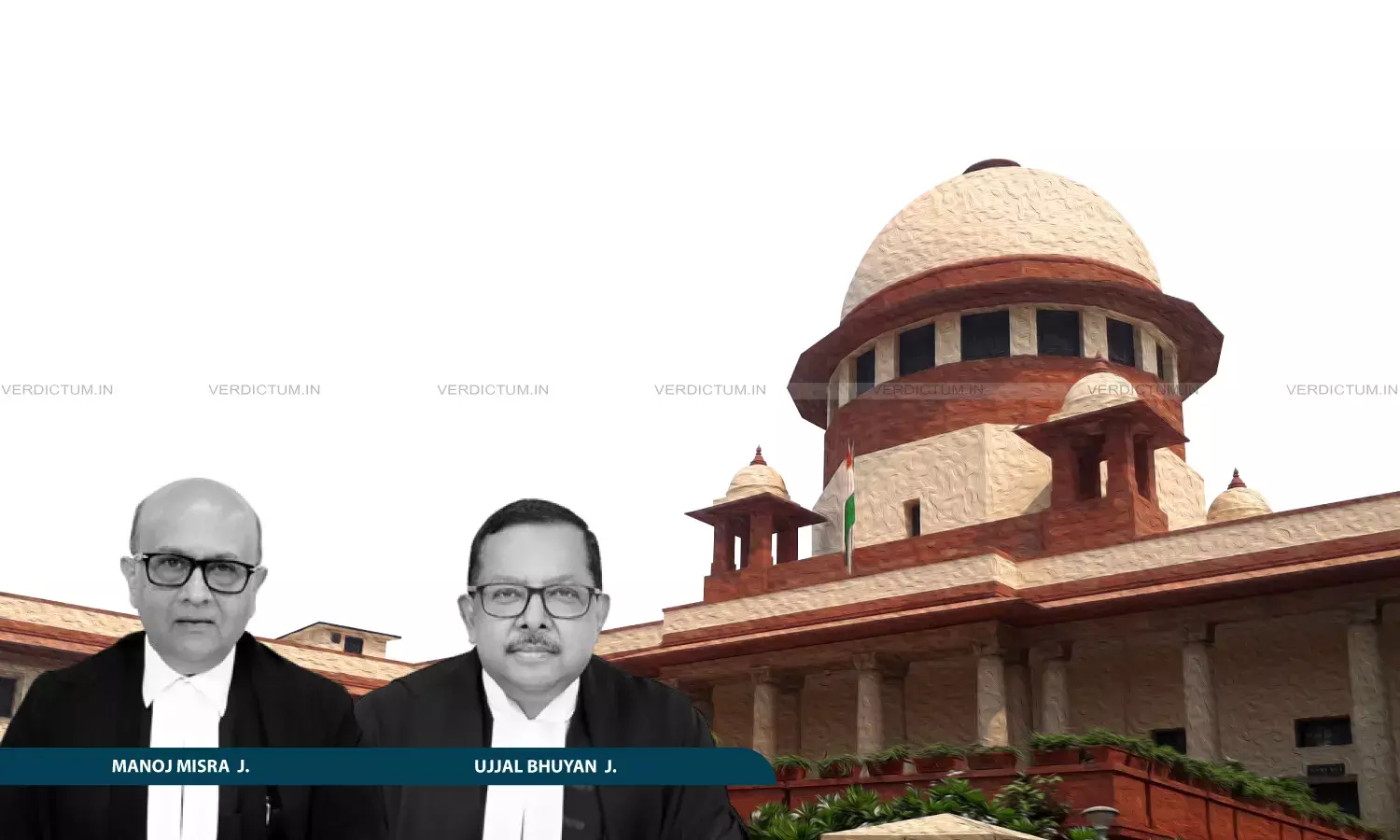Supreme Court: Arbitrator’s Role Confined To Enforcing Interest Regime Once Parties Agree On It; Courts Can’t Rewrite Award By Introducing Further Interest
The Supreme Court said that the discretion of the Arbitral Tribunal to award interest under Section 31(7)(a) of the Arbitration and Conciliation Act, 1996 (A&C Act) is subservient to the agreement between the parties.

Justice Manoj Misra, Justice Ujjal Bhuyan, Supreme Court
The Supreme Court reiterated that the Arbitrator’s role is confined to enforcing the interest regime once parties agree on the same and the Courts cannot rewrite the award by introducing further interest.
The Court reiterated thus in a Civil Appeal filed by a company against the Judgment of the Telangana High Court, which set aside the Order of the Principal Special Court.
The two-Judge Bench of Justice Manoj Misra and Justice Ujjal Bhuyan observed, “… reliance placed by the respondent on Hyder Consulting (supra) to claim post-award interest is misplaced. That principle would apply only when the arbitral tribunal leaves a matter unqualified or is silent. In the present case the arbitral tribunal bound by the MoU and exercising its statutory discretion had already specified the interest rate (21% per annum) and the duration (until repayment). As held in Morgan Securities and Credits Private Limited (supra), reaffirmed in Delhi Airport Metro Express Private Limited (supra) and explained in S.A. Builders Limited (supra), once parties agree on the interest regime, the arbitrator’s role is confined to enforcing it and the courts would not rewrite or enlarge the award by introducing further interest at the execution stage.”
The Bench said that the discretion of the Arbitral Tribunal to award interest under Section 31(7)(a) of the Arbitration and Conciliation Act, 1996 (A&C Act) is subservient to the agreement between the parties.
“In other words, party autonomy, so crucial to arbitration, reigns supreme”, it added.
Senior Advocate Hemendranath Reddy appeared on behalf of the Appellant while Senior Advocate P.B. Suresh appeared on behalf of the Respondent.
Facts of the Case
The two parties had entered into a Memorandum of Understanding (MoU) in 2014 regarding a sale and transfer of a land. The Appellant was the vendor which had acquired absolute ownership of the schedule land under different Sale Deeds which was to be used for construction of a five-star hotel but for various reasons did not go ahead with the project and instead decided to sell the land to the Respondent. Under the MoU, the Respondent paid a sum of Rs. 15.5 crores as advance to the Appellant. As differences arose between the parties, MoU was terminated whereafter the dispute was referred to arbitration.
The Arbitral Tribunal awarded Rs. 15.5 crores to the Claimant (Respondent) with interest at the rate of 21%. The Appellant filed a Petition under Section 34 of the A&C Act, before the Special Court for trial and disposal of commercial disputes. The same was dismissed and there was no further challenge to the award. Thereafter, the Respondent filed an Execution Petition and the Executing Court held that claim of the decree holder for compound interest on the awarded amount was not sustainable. This was assailed before the High Court, which set aside the same and remitted back the matter to the Executing Court. Being aggrieved, the Appellant was before the Apex Court.
Reasoning
The Supreme Court after hearing the contentions of the counsel, noted, “… in the light of the express provision contained in clause (a) of sub section (7) of Section 31, the arbitral tribunal awarded interest in terms of the MoU from the date of the cause of action till the date of repayment. As the arbitral tribunal had expressly provided interest till the date of repayment, question of additional or compound interest under clause (b) of sub-section (7) of Section 31 of 1996 Act would not arise.”
The Court said that the Arbitral Tribunal in its award, faithfully complied with the MoU agreed by and between the parties and thus, it exercised its discretion within the overall framework of Section 31(7) of the A&C Act aligning with the legislative intent that the award, rather than the statutory default, should govern the parties, more so in a case as in the present one where the parties have themselves made provision for interest throughout.
“The MoU did not stipulate compounding of interest; the arbitral tribunal did not award compound interest; therefore, respondent cannot at the stage of execution seek to introduce claim of compound interest by drawing on general principles. Allowing such a claim would amount to rewriting the award at the stage of execution which is impermissible”, it observed.
The Court, therefore, concluded that the High Court was not justified in setting aside the Order of the Executing Court and remanding the matter for fresh determination.
Accordingly, the Apex Court allowed the Appeal, set aside the High Court’s Judgment, and restored the Executing Court’s Order.
Cause Title- HLV Limited v. PBSAMP Projects Pvt. Ltd. (Neutral Citation: 2025 INSC 1148)


